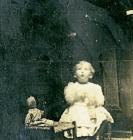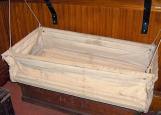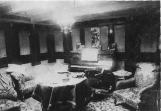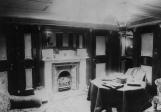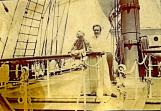14
Q. What did your mother think of the sailors?A. Oh, she was very fond of the sailors. The 'Belmont' had the reputation of being a good ship, and of treating the men well and they said, 'Do you want to go on the 'Belmont', because there is a lady there and we get good food and we get good treatment there. The sailors knew that my mother would always stand up for the sailors. Not that my father was particularly cruel, in fact he wasn't, he was a very kind man. I thought the world of him. But you had to have complete discipline on the vessel. And if you didn't have discipline the men would take over, and there would always be a few very bad types there, and that is why mutinies started. But my father always had complete control, and if he spoke, the sailor said, 'Aye, aye, Sir,' and immediately did it, and I can remember once as a small child I was horrified, one of the sailors was knocked down because instead of speaking he was impertinent. What he said, I don't know, but the first thing I saw was the sailor lying on the floor, and that was against the rules, but nevertheless that was the way my father handled it. The next time that sailor spoke he tipped his head and said, 'Aye, aye, Sir.' There was no more trouble. But that was the way things had to be handled because there was no other way. There was only one law, one doctor, one everything, that was the Captain in charge of the vessel. And his word had to be law.
15
Q. Was there ever a mutiny aboard the Belmont?A. No, there never was. But one time there was a very difficult crew. Mother and I weren't on the vessel that time, but my father that time said that he never went to bed, nor did the First Officer go to bed without a revolver under his pillow. And the Second Officer, being a younger man, was never allowed to watch by himself. My father took the watch with him, which was a four hour watch, depending upon whether it be from eight to twelve at night, twelve to four, or four to eight, he would be with that man to make sure that nothing happened, because he was suspicious of the sailors. They were gruff, they never sang, they never laughed, they never had any fun during their time off, they would just sit there and whisper among themselves.
16
Q. Why would they have signed on?A. Well I don't know why they signed on. They were sailors. It just happened that a whole lot of bad ones got together. Generally there was a mixture of regular able seamen and good sailors mixed with the others, so that the mixture would be all right. This time, I suppose, the mixture happened to be a bad mixture.
18
Q. How old were you when you made your first trip?A. Eighteen months.
20
Q. How did you live at that time? What kind of sleeping accommodation did you have?A. Well, they made this large square canvas box and it was hung up there, like a hammock, a swinging hammock would be hung, and that was put in my family's stateroom which was a large 16 foot stateroom about 10 feet wide with an alcove for a huge bed. There was plenty of room there to swing this hammock. And until I got old enough for my own stateroom, which was across the cabin on the other side of the vessel, why I slept there. But I was quite indignant, I can remember, being told that was going to be my cabin, that I was going to be alone. I remember I was quite annoyed about it, because the berth was all by itself, it was up high and there was a big board to keep you from falling out, and I had to climb over a settee in order to get up to it, you see. And I didn't like being perched way up there like that.
21
Q. Knowing that the type of men that some of these sailors were, being alone in your stateroom did you ever worry?A. Oh goodness no. First of all, I didn't know that kind of type of man. I always thought the sailors were lovely and they were always making gifts for me. And there was a kind of very ornate (which I am sorry I didn't keep) puzzle, which actually had buttons in the middle of it, but I had to shake it and hear it there, and think it probably had lovely jewels in it, you see. But was all made of pieces of wood and they were carved, and they put them together and it made a round like a hedgehog ball, you see, with all these things sticking out. And that would take hours and hours and hours, of course it would give them something to do. I don't know who gave it to me. But I had all sorts of little gifts the sailors would give to a child. The sailors loved the children, and as far as that goes, they all took care of her, but nevertheless there was always the chance that there would be one maverick among the crowd, you see. As a whole, even the roughest sailors would be nice to a child. At Christmas time I always gave them…. I was allowed to…. well father or mother arranged for pipes, tobacco, and we made candy and we did that up and the cabin boy would take that up….a huge basket of this and I would go around and give all the sailors their Christmas presents. So there was a good feeling between the sailors and the Captain and the Officers. But there had to be perfect discipline. I mean, it might be a case of saving the vessel from a wreck, unless there was complete discipline, you see. I mean, in a storm, you had to move quickly.
23
Q. Did you ever get seasick during those storms?A. No, I never did. I didn't know anything about seasickness. Mother was once in awhile when the vessel would be pitching which was going that way, you know, she wouldn't feel too well, and she would say, 'Now Kathryn, be quiet.'
25
Q. What did you do during the times you were going through these storms?A. Well, we were kept in bed. I was kept in my stateroom, and it was rather hard. You'd be tied up during the storms maybe for three days. You couldn't get out of your bunk, because it would be dangerous to be allowed. My father would come down and see me and then go in and talk to my mother for a few minutes. The cabin would bring us meals of a sort. I can't remember what we had to eat, but we couldn't have had very much, because the cook couldn't have done much cooking with these terrible storms. The waves would be like mountains. I would get up and look out of the porthole, and first thing my nose practically touching the water when I'd look out, you see. Then slowly she would roll over the other way and I would look and see the huge waves, and then I would see the sky, and slowly she'd go down again and there would be a pitching with it, but she would roll and pitch, you see. After a few times I would tire of that and I would go back to hanging on the board. My father would say, 'Well, just one more day of the storm and then I think it will begin to lessen.' These sea captains knew the weather very well, you know. They would watch it. They were very good weathermen. So, consequently he would say I think another day, and I would get up and say, 'Father, can we get up yet?' And he would say, 'Well, perhaps this afternoon it will be safe.' So we would get up in the afternoon, and Mother and I would make for the chairs which were fastened to the floors, you see, and we would just sit there hanging onto the chair because it would still be rolling. But my idea of a really good time, at that time, was to get on a pillow on one side of the vessel, and as she rolled, slide down on the hardwood floors. There were no carpets on the floors when you were at sea because it was too damp - so slide right down to the other wall. So I would do that for awhile, but Mother would stop me after awhile - she couldn't stand it, watching me!
27
Q. Well, this was after you were out. What did you do when you were confined to your bed?A. Oh well, there were some crayons, and if I was old enough I did some reading. Beforehand, I don't know what I did. I must have been rather a good child, because well, I stayed in bed because I knew I had to. Everybody was disciplined on the boat and of course, I was disciplined along with the rest. I mean, I never saw anybody disobey my father. So it never entered my head not to obey him. I knew he had to be obeyed because everybody else obeyed him.
